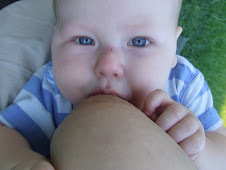While pregnant with my first child I didn't have a strong belief or point of view on breastfeeding. It is widely accepted and believed to be the ideal choice of food for any infant, but for many, including my former self, formula is a perfectly acceptable substitute. Infant formulas are also often believed to be just as good as breastmilk. And why not believe this, it's how they are marketed, many hospital nurses push it even when you wish to breastfeed, and the answer to any problem with a nursing infant is to supplement with formula. Is it any wonder I hardly breastfed my first daughter past a few months?
During the short time I breastfed Maggie, I didn't enjoy it. I was told that cracked and bleeding nipples were part of the horrors of breastfeeding, and so when mine became cracked and bloody, I nursed through it, and of course, hated the experience. I wasn't informed by anyone that the choices I made, even in birth, could affect our nursing relationship or that just one bottle could be the beginning of the end. At that point in time, I don't know that having the information would have changed any of my choices anyway. For me, I think I had to take that path and make those choices. It has aided in the way I've formed my current opinions.
You see, I've been there, I've done that. I'm not looking down on women who were given poor advice or lack(ed) the information available. I didn't have it myself. I have been on all sides of the spectrum: I nursed and switched, I exclusively formula fed and I exclusively breastfed. When I say "I know how you feel" in regards to breastfeeding and formula feeding, I mean it.
Thankfully, despite not getting the best start in life, my girls are thriving and healthy. That's wonderful. I didn't see that and say to the indisputable scientific fact "This is untrue, my kids are FINE, therefore, formula does not decrease overall health!". No, instead I said, "This is amazing, interesting information. How lucky I am that my girls don't have (insert health issue, like asthma, diabetes, childhood obesity, etc) for not receiving breastmilk." But, just because my girls came out unscathed didn't mean I couldn't do my best to give my next baby an even better chance at a healthy start to his life. I made it my mission to succeed at breastfeeding. That mission started while I was pregnant with my son.
I read EVERYTHING. I joined breastfeeding forums to see what problems real women were facing with breastfeeding. I read "The Womanly Art of Breastfeeding" from cover to cover like it was the breastfeeding bible. I posted concerns and sought help, before I could even have a problem. I figured, the issues with breastfeeding in the past, for me, were all due to lack of information, so I armed myself. The worst thing, I imagined, would be to have an issue arrive, and try to find the answer at that time, rather than avoiding the issue to the best of my ability, or having the answer already.
I learned my nipples cracked and bled with my first daughter because she wasn't latched properly. A baby who's properly latched will not cause that kind of pain or damage. The only thing that should be expected is initial soreness, for the first few weeks and a slight discomfort at latch on. Once your baby is suckling away, it shouldn't hurt. If it does, it's not right. Learn about proper latch while pregnant. It's ok to have to "learn" to breastfeed. It's natural, but you and your baby will both have to be teachers and believers in each other.
I also learned that scheduling was not only unnecessary, but could hurt my supply and our nursing relationship. When you have a newborn, their stomach is only the size of a marble, and by 1 week the size of a pingpong ball. You cannot expect so much to fit in there. This is why your newborn will nurse almost constantly, because it can only take so much at a time. I didn't resent nursing every 1-2 hours, knowing this is what my baby needed and WHY he needed it.
Weight loss and weight gain are always on a parent's mind. Many babies will lose 10% of their birth weight while in the hospital. This is normal, I learned, and no cause for concern. I also found that when you're receiving IV fluids in labor, your baby is going to have water weight, so they aren't actually losing as much as you think. Wet and poopy diapers were the best way to gauge my newborn's intake, and there were definitely plenty of those!
I could write a book on this information (which is why La Leche League has done that with the womanly art of breastfeeding) because there is a solution or explanation to almost EVERY scenario in the breastfeeding world, you just have to know where to find that info!
If I had to limit my advice to the single most important factor in successful breastfeeding, it would be preemptive education/prevention. You don't search for the answers to the questions on your test while you're taking it, you prepare for it. You study, you perfect your knowledge the best you can with all the resources available. Breastfeeding should be no exception, if you truly wish to succeed. You'll find your breasts aren't too small or too large; that your baby may nurse every hour for 45 minutes or every 3 hours for 15; That your baby doesn't know how to latch right away and it may take 1 try or 100 tries. The one constant, the one truth, is that less than 3-5%(depending on the source) of women can truly not breastfeed their babies exclusively, so chances are, the issues you might be facing, can be worked through. You just need the tools.
2.08.2010
Diaries of a Milk Maid
Labels:
babies,
breast-feed,
breastfeeding,
experience,
facts,
help,
helpful,
learning,
milk,
myths,
nursing,
scared,
toddlers
Subscribe to:
Post Comments (Atom)





No comments:
Post a Comment